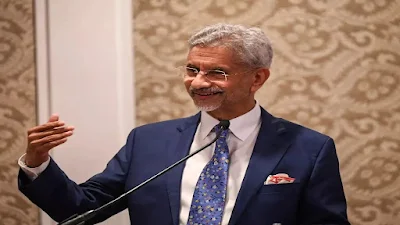In a powerful video message delivered during a ceremony in Mumbai, External Affairs Minister Dr. S. Jaishankar reaffirmed India’s unwavering commitment to safeguarding its sovereignty and strategic autonomy. "India will never allow others to exercise a veto over its choices," he stated, underscoring that the nation will continue to pursue what is right—both in its national interest and in service of the global good—without yielding to external pressure or ideological conformity.
Dr. Jaishankar's remarks were made on the occasion of the 27th SIES Sri Chandrasekarendra Saraswati National Eminence Awards, where he was honoured in the category of Public Leadership. The prestigious awards, which recognize excellence across Public Leadership, Community Leadership, Human Endeavour, Science and Technology, and Social Leadership, are named in tribute to the revered 68th Seer of the Kanchi Kamakoti Peetam.
Emphasizing the evolving role of India in the international arena, Jaishankar noted that as the nation’s imprint on global consciousness deepens, the implications are profound. In a world struggling with unsustainable lifestyles, climate challenges, and rising stress levels, he said, India's heritage offers enduring lessons. However, he cautioned that these contributions will resonate globally only when Indians themselves embrace and take pride in their cultural legacy.
“In the age of globalization, technology and tradition must move forward together,” Jaishankar asserted. He emphasized that India’s rise must be rooted in its cultural ethos—its Bharatiyata. “Bharat will inevitably progress, but it must do so without losing its identity. Only then can we truly emerge as a leading power in a multipolar world.”
Reflecting on India’s post-colonial trajectory, he remarked that the country has often been encouraged to view progress as a rejection of its own traditions. “Perhaps this stemmed from an overreliance on imported models or a discomfort with our own civilizational practices. But today, a more authentic national voice is emerging, and India is rediscovering its unique persona,” he said.
Dr. Jaishankar highlighted India's standing as a “civilizational state”—a concept that lends the country both depth and distinctiveness in its global engagement. He argued that for India to exert meaningful influence on the world stage, it must fully harness its cultural and civilizational strengths. “For that to happen, especially our younger generation must internalize and value this heritage. This awareness must go beyond academic discourse and make a tangible impact at the societal level.”
Positioning India at a critical historical juncture, he reflected on the past decade of transformation. The country, he said, has demonstrated the capacity and commitment to advance on multiple development fronts, effectively addressing long-standing challenges such as poverty, inequality, and lack of opportunity. Internationally, India has affirmed its role as a sovereign and independent power committed to the greater global good—particularly the interests of the Global South.
Yet, he acknowledged, many internal challenges persist. “Some viewpoints continue to be pessimistic—even disparaging of our national identity. Overcoming these will be essential as we strive toward a more confident, self-assured India,” he concluded.




.png)
The opinions posted here do not belong to 🔰www.indiansdaily.com. The author is solely responsible for the opinions.
As per the IT policy of the Central Government, insults against an individual, community, religion or country, defamatory and inflammatory remarks, obscene and vulgar language are punishable offenses. Legal action will be taken for such expressions of opinion.